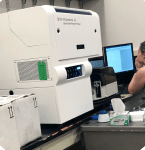 A molecule that helps prevent fat accumulation in mammals is produced within fat tissues by stem-like cells that may be therapeutic targets for obesity and related disorders, according to a new study. Obesity increases the risk of other major diseases including cancers, heart disease, diabetes and immunological disorders.
A molecule that helps prevent fat accumulation in mammals is produced within fat tissues by stem-like cells that may be therapeutic targets for obesity and related disorders, according to a new study. Obesity increases the risk of other major diseases including cancers, heart disease, diabetes and immunological disorders.
News
Cornell invests 2 million dollars to transform flow cytometry
Gale and Ira Drukier Prize in Children’s Health Research awarded
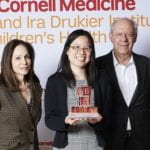 Helen Su, a clinical immunologist who has made key discoveries into the genetic causes of rare immune system diseases in children, has been awarded the fourth annual Gale and Ira Drukier Prize in Children’s Health Research by Weill Cornell Medicine. The Drukier Prize honors an early-career pediatrician whose research has made important contributions toward improving the health of children and adolescents.
Helen Su, a clinical immunologist who has made key discoveries into the genetic causes of rare immune system diseases in children, has been awarded the fourth annual Gale and Ira Drukier Prize in Children’s Health Research by Weill Cornell Medicine. The Drukier Prize honors an early-career pediatrician whose research has made important contributions toward improving the health of children and adolescents.
Nanovaccine boosts immunity in sufferers of metabolic syndrome
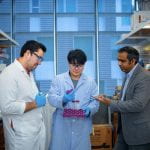 A new class of biomaterial developed by Cornell researchers for an infectious disease nanovaccine effectively boosted immunity in mice with metabolic disorders linked to gut bacteria – a population that shows resistance to traditional flu and polio vaccines. The study is the first to explore the interrelationship among nanomaterials, immune responses and the microbiome, an increasingly important area of research.
A new class of biomaterial developed by Cornell researchers for an infectious disease nanovaccine effectively boosted immunity in mice with metabolic disorders linked to gut bacteria – a population that shows resistance to traditional flu and polio vaccines. The study is the first to explore the interrelationship among nanomaterials, immune responses and the microbiome, an increasingly important area of research.
Immunologist Carl Nathan wins Weill Achievement Award
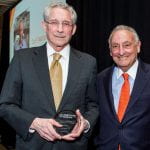 Carl Nathan, chairman of the Department of Microbiology and Immunology at Weill Cornell Medicine, has been awarded the institution’s Joan and Sanford I. Weill Exemplary Achievement Award. The award recognizes outstanding faculty members whose transformational work enhances health and health care worldwide.
Carl Nathan, chairman of the Department of Microbiology and Immunology at Weill Cornell Medicine, has been awarded the institution’s Joan and Sanford I. Weill Exemplary Achievement Award. The award recognizes outstanding faculty members whose transformational work enhances health and health care worldwide.
Richard Cerione and Claudia Fischbach featured in Ezra
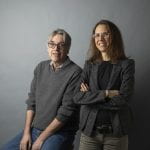 Dr. Cerione researches cancer cell metabolism, looking at the biological signaling cues and pathways that regulate cell growth, differentiation and development, and the protein-protein interactions underlying the metabolic changes required for cancer development; Dr. Fischbach uses tissue engineering, microfabrication and biomaterials strategies to study cancer cells’ interactions with other cells and the extracellular matrix and their importance to the development and progression of cancer.
Dr. Cerione researches cancer cell metabolism, looking at the biological signaling cues and pathways that regulate cell growth, differentiation and development, and the protein-protein interactions underlying the metabolic changes required for cancer development; Dr. Fischbach uses tissue engineering, microfabrication and biomaterials strategies to study cancer cells’ interactions with other cells and the extracellular matrix and their importance to the development and progression of cancer.
Cornell Center for Immunology launches
 Building on Cornell’s decades of fundamental and comparative research in the immunological sciences, Provost Michael Kotlikoff has announced the creation of a new Cornell Center for Immunology. The virtual center will combine multiple research efforts across several departments and colleges on the Ithaca campus and strengthen ties to the university’s ongoing immunological research at Weill Cornell Medicine in New York City.
Building on Cornell’s decades of fundamental and comparative research in the immunological sciences, Provost Michael Kotlikoff has announced the creation of a new Cornell Center for Immunology. The virtual center will combine multiple research efforts across several departments and colleges on the Ithaca campus and strengthen ties to the university’s ongoing immunological research at Weill Cornell Medicine in New York City.


